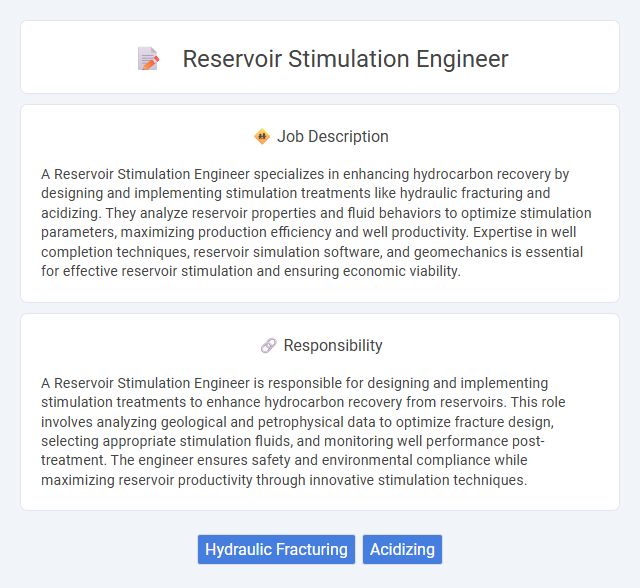
A Reservoir Stimulation Engineer specializes in enhancing hydrocarbon recovery by designing and implementing stimulation treatments like hydraulic fracturing and acidizing. They analyze reservoir properties and fluid behaviors to optimize stimulation parameters, maximizing production efficiency and well productivity. Expertise in well completion techniques, reservoir simulation software, and geomechanics is essential for effective reservoir stimulation and ensuring economic viability.
Individuals with strong analytical skills, a solid understanding of petroleum engineering, and the ability to work in high-pressure environments may be well-suited for a Reservoir Stimulation Engineer role. Candidates who are comfortable with fieldwork, possess problem-solving capabilities, and have a keen interest in optimizing hydrocarbon production will likely find this job fulfilling. Those who prefer routine tasks or lack adaptability might face challenges in this dynamic and technically demanding profession.
Qualification
A Reservoir Stimulation Engineer typically requires a Bachelor's degree in Petroleum Engineering, Chemical Engineering, or a related field, often complemented by a Master's degree for advanced roles. Proficiency in hydraulic fracturing, acidizing techniques, and reservoir modeling software such as Petrel and Eclipse is essential. Strong analytical skills, familiarity with wellbore construction, and experience in designing stimulation treatments to enhance hydrocarbon recovery are critical qualifications.
Responsibility
A Reservoir Stimulation Engineer is responsible for designing and implementing stimulation treatments to enhance hydrocarbon recovery from reservoirs. This role involves analyzing geological and petrophysical data to optimize fracture design, selecting appropriate stimulation fluids, and monitoring well performance post-treatment. The engineer ensures safety and environmental compliance while maximizing reservoir productivity through innovative stimulation techniques.
Benefit
Reservoir stimulation engineers are likely to benefit from high demand in the oil and gas industry due to their specialized skill set in enhancing well productivity. Their expertise in hydraulic fracturing and acidizing techniques can result in competitive salaries and opportunities for career advancement. Working in this role might also provide exposure to cutting-edge technology and challenging projects that enhance professional growth.
Challenge
Reservoir stimulation engineers often face the challenge of optimizing well performance under complex geological conditions, where uncertainty in reservoir properties can impact stimulation effectiveness. They likely need to design and implement tailored stimulation treatments that enhance hydrocarbon recovery while minimizing environmental risks. Balancing cost-efficiency with technical innovation may also present ongoing difficulties in this role.
Career Advancement
Reservoir stimulation engineers specialize in enhancing hydrocarbon recovery through advanced techniques like hydraulic fracturing and acidizing, playing a crucial role in maximizing reservoir performance. Career advancement in this field often involves progressing from technical roles to senior engineering positions, project management, and eventually leadership roles within oilfield services or energy companies. Gaining expertise in reservoir simulation software, field operations, and multidisciplinary collaboration significantly boosts prospects for higher-level opportunities and increased industry impact.
Key Terms
Hydraulic Fracturing
A Reservoir Stimulation Engineer specializing in Hydraulic Fracturing designs and implements fracture treatments to enhance hydrocarbon flow from unconventional reservoirs. They analyze geological data, select optimal fracturing fluids and proppants, and monitor pressure responses to maximize reservoir productivity while minimizing environmental impact. Expertise in hydraulic fracture modeling, well performance evaluation, and real-time treatment adjustments is essential for improving recovery rates.
Acidizing
A Reservoir Stimulation Engineer specializing in acidizing designs and implements chemical treatments to enhance hydrocarbon flow in carbonate and sandstone reservoirs. Expertise in acid formulation and placement techniques, such as matrix acidizing and acid fracturing, optimizes permeability and mitigates formation damage. Proficiency in evaluating reservoir characteristics and monitoring treatment effectiveness ensures improved well productivity and economic recovery.
 kuljobs.com
kuljobs.com